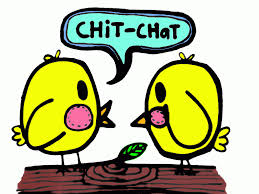Hello and welcome to Stivi Cooke’s English Lessons!
(Use a dictionary to find the meanings of the words in bold later.)
What’s chit-chat? It means short, simple conversations with friends and people you meet during the day. It’s not the same as talking at work, in meetings, on the phone or discussing one topic in a very detailed way. Chit-chat or ‘chatting’ is just a way of communicating informally with people. You could talk about the weather, the sport on TV last night or yesterday’s wedding party that you went to.
So what’s the difference between ‘chatting’ and other forms of speaking? The most important difference is the ability to continue the conversation with another person. So good conversation or chatting is like practicing tennis: you keep the ‘ball’ (the subjects of your chat) moving between speaker and listener. You do this by giving more information than is necessary for a short answer.
It doesn’t matter if you just want to talk to foreigners, study speaking for IELTS or TOEIC, or use English for work. A good talking technique is important and much better than a big vocabulary or using your grammar correctly. Why? Because longer conversations help you make friends, communicate ideas and express feelings.
Like many forms of talking, chatting or general conversations have some basic informal rules.
|
NOT GOOD! |
BETTER! |
|
|
Don’t give YES/NO answers |
A: It’s very hot today! B: Yes. |
A: It’s very hot today! B: Yes, I think I’ll go to the beach! |
|
Give a longer answer |
A: Do you like the World Cup? B: Yes, I do. |
A: Do you like the World Cup? B: Yes, I do! I’m going to watch every game! |
|
Ask follow-up questions |
A: Do you like my new shoes? B: Wow! They’re great! |
A: Do you like my new shoes? B: Wow, they’re great! Where did you buy them? |
|
Add your opinions, feelings and comments |
A: How are you today? B: I’m tired. |
A: How are you today? B: I’m tired! These hot nights are terrible! |
|
Add explanations and reasons so the listener can make a reply |
A: What are you doing today? B: I’m going shopping. |
A: What are you doing today? B: I’m going shopping for shoes because my old shoes look awful and I have some lucky money to spend! |
|
You can change subjects or add more subjects to the chat |
A: How’s life today? B: Not good! |
A: How’s life today? B: Not good! I have a big exam today and I’m nervous! A: Well, do your best anyway! B: Yes, I’ll try! Hey, want to see a movie tonight? |
EXERCISE: Try speaking the conversations above – both ‘not good’ and ‘better’ with a friend. You will see and hear the differences very quickly. Try the ‘better’ examples with topics like the weather, sport, shopping and doing something in your free time.
So how will you know if you are talking well or not?
That’s easy – you can talk without stopping the conversation and the listener replies often – you will know that you are communicating well. If you are stopping to think of something to say – then it’s not working well. Maybe you are not giving enough information to let the listener reply. Maybe you are not explaining your topic (or yourself) very well.
In the next lesson, we’ll look at how you fix those problems and find other ways to continue a conversation!
Send your comments to TUOI TRE NEWS at ttn@tuoitre.com.vn – we’d love to hear from you!
Hen gap lai!
Stivi Cooke
TESOL/Master of Education













































